Pwn-php pwn分析与phpgdb插件
推荐 原创【Pwn-php pwn分析与phpgdb插件】此文章归类为:Pwn。
国内比赛最近非常喜欢出php的pwn,php解释器本身没有太多的可利用点,出题一般把漏洞埋在php的拓展。掌握了php的调试、函数传参、堆内存管理以后这类题难度都不大。
由于php题的难度主要在调试方面,但是又没有很好用的gdb插件,因此自己写了一个phpgdb用于调试。
安装php,并查看版本,
推荐使用源码安装,因为这样会有调试符号,便于本地调试(尤其是学习堆的时候)
这样是由完整调试符号和源码的:
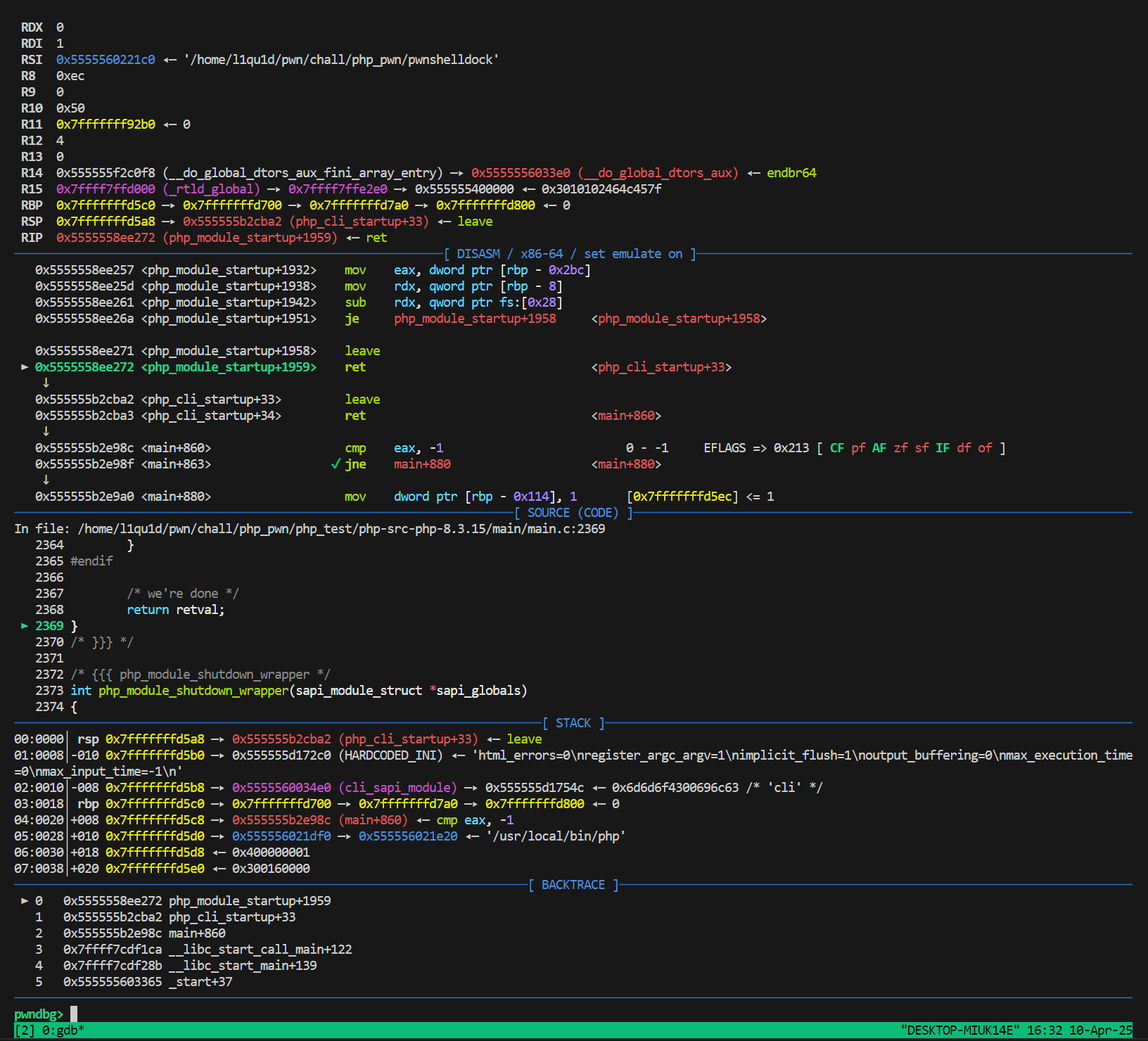
主要关注其中的disable_functions、disable_classes和extension,前二者限制了可以用于编写php利用脚本的函数和类,后者一般是pwn选手需要关注的带有漏洞的拓展文件。
下载对应版本的php源码,进入ext目录,创建一个拓展
在拓展名对应的目录具有如下结构:
其中easy_phppwn_arginfo.h头文件与拓展的参数信息有关,不需要手动修改,在easy_phppwn.stub.php中修改对应的文件即可。默认生成的只有test和test2两个函数,加入test3:
随后自动构建easy_phppwn_arginfo.h
添加函数功能
编译,configure生成的Makefile需要删去-O2优化,否则会加上FORTIFY保护,导致memcpy函数加上长度检查变为__memcpy_chk函数:
在modules目录下会生成编译好的拓展文件easy_phppwn.so。
默认的拓展路径通过命令查看:
拓展在Linux下是一个动态链接库,通常在php.ini中导入,并将so文件移动到上步输出的拓展路径下:
或者直接通过命令运行,而无需导入:
自己写了个gdb python脚本phpdbg,用于php调试,功能会逐步完善。
首先编写一个php代码:
运行说明成功
gdb进行调试
根据php启动过程,在php_module_startup()函数中加载拓展:
因此下断点跑完这个函数就能看到模块被加载进来:
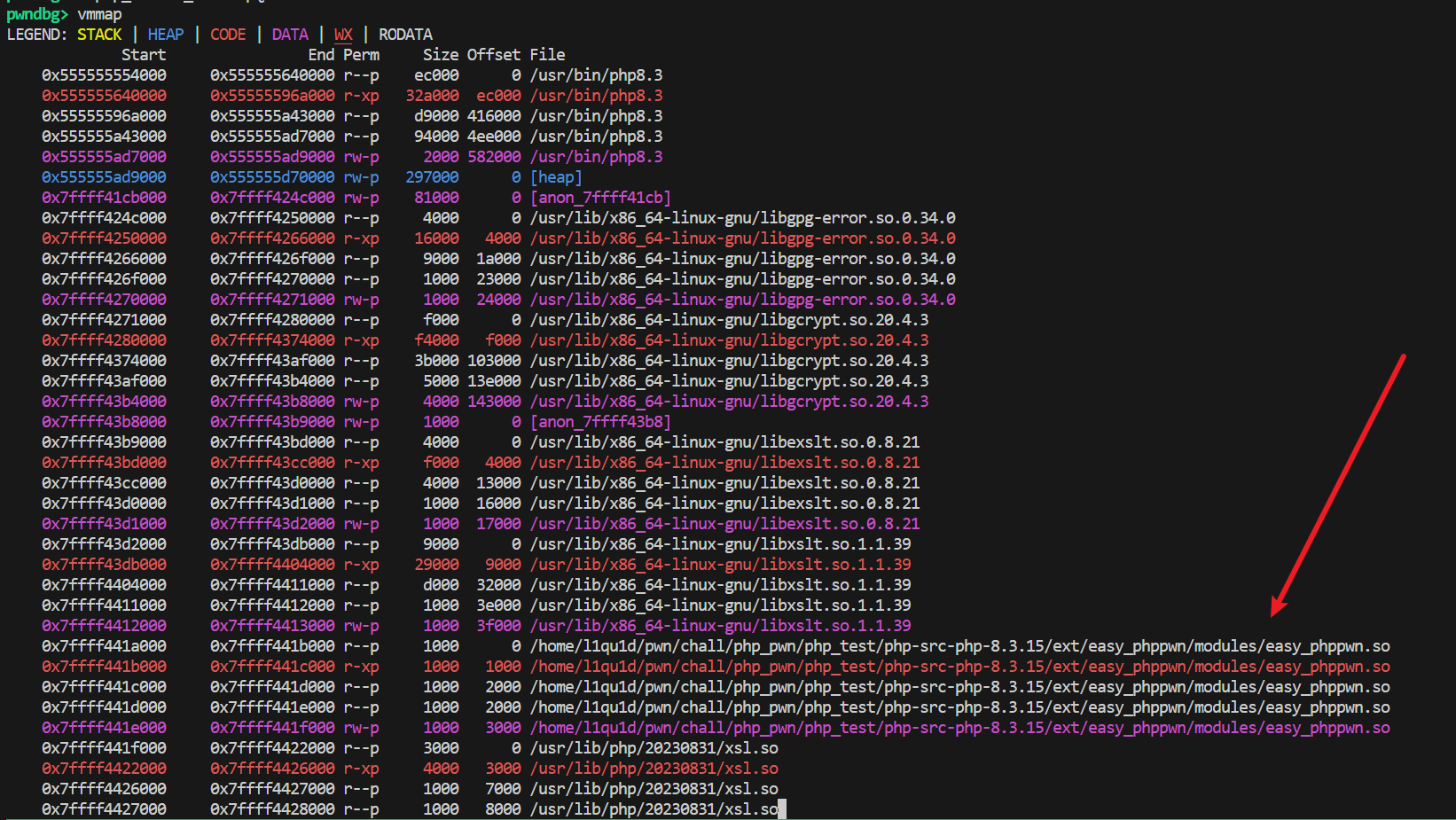
此时可以接着下断点到zif_test1,这里需要注意php编译之后的是函数名会加上zif_前缀
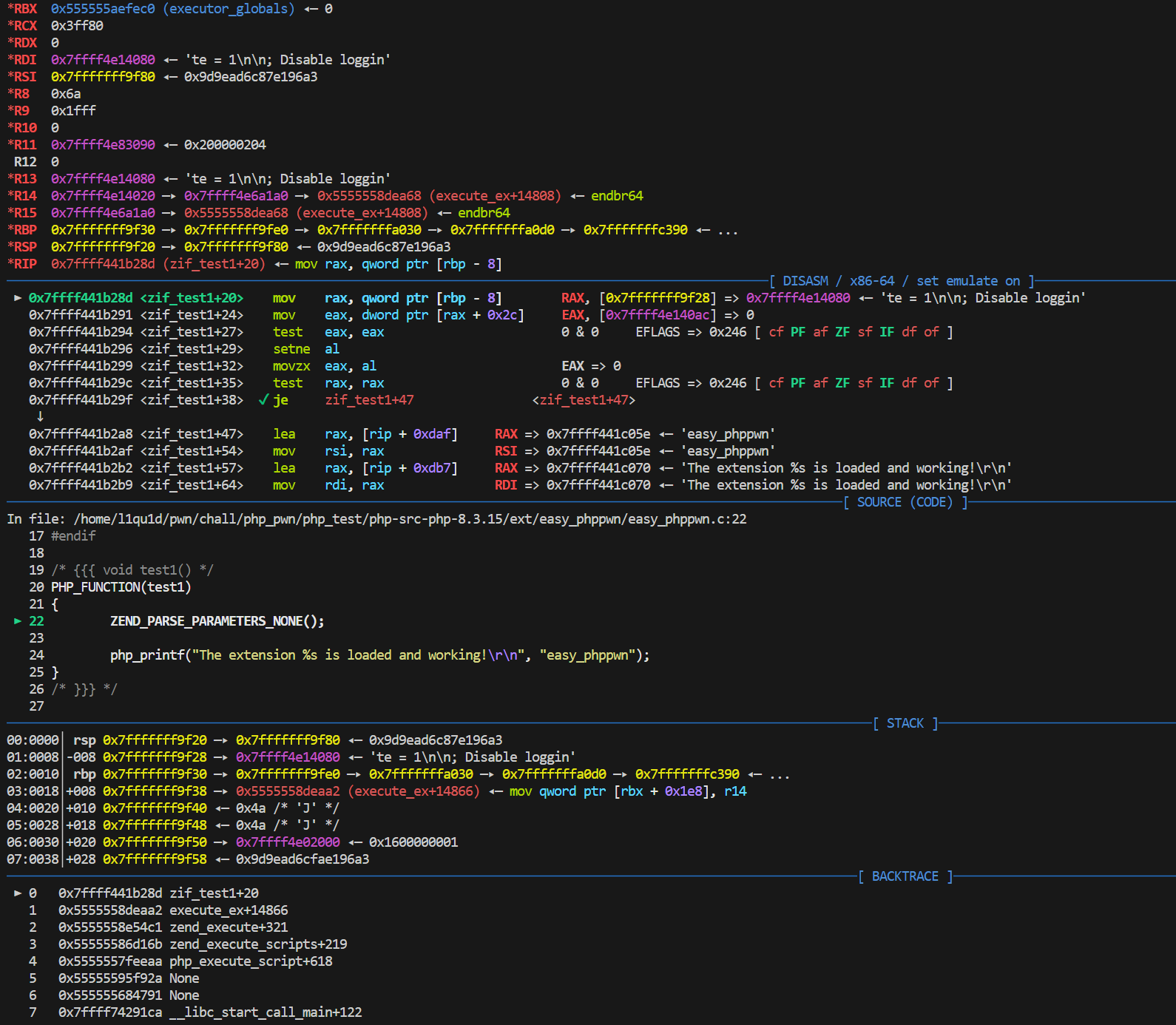
test3中可以看到栈溢出:
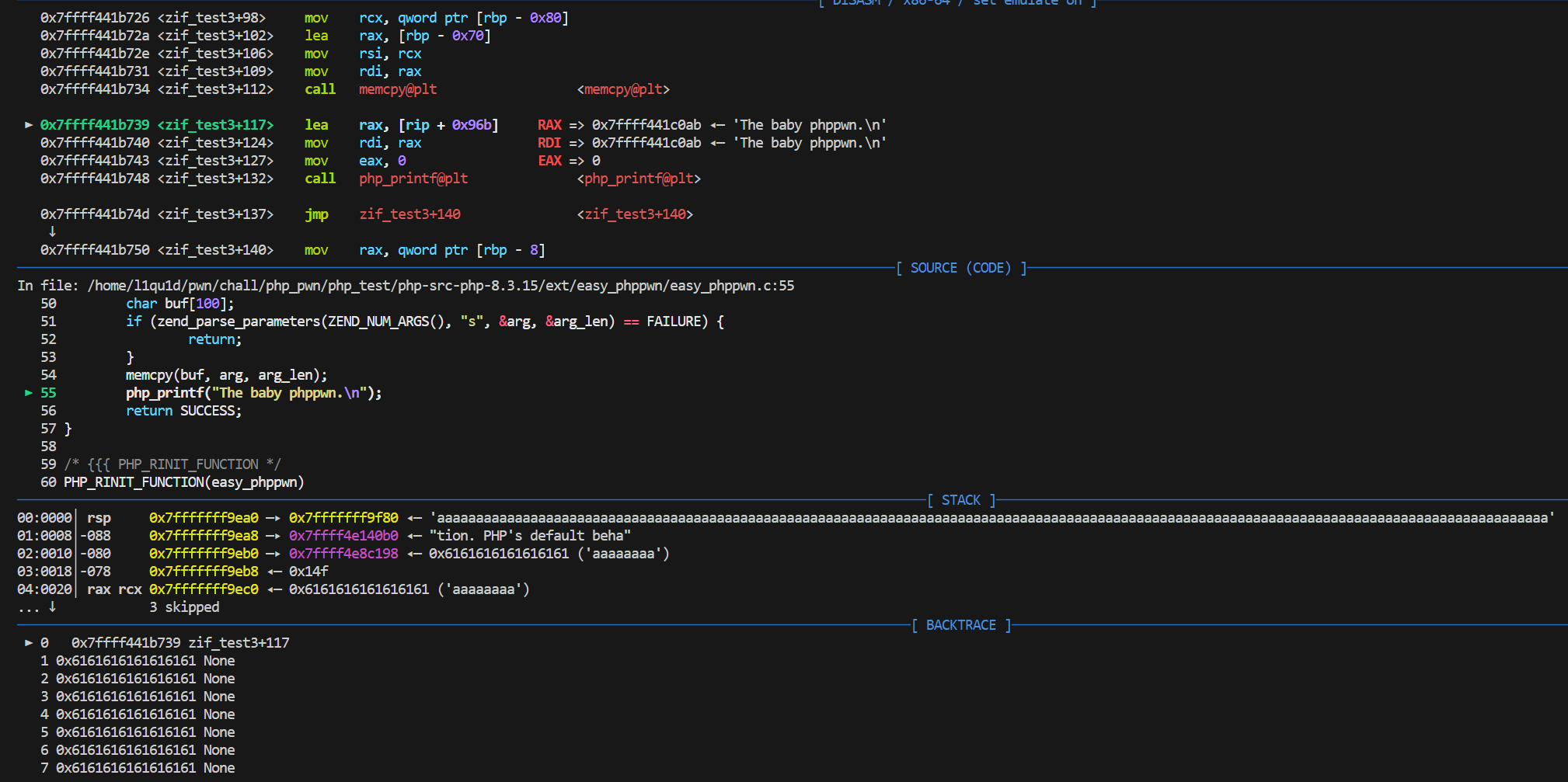
这里就不再赘述这个案例的利用方式了,结合后续题目进行介绍。
反编译的代码来看基本上除了参数处理以外就是原生的C代码,可读性比较强。
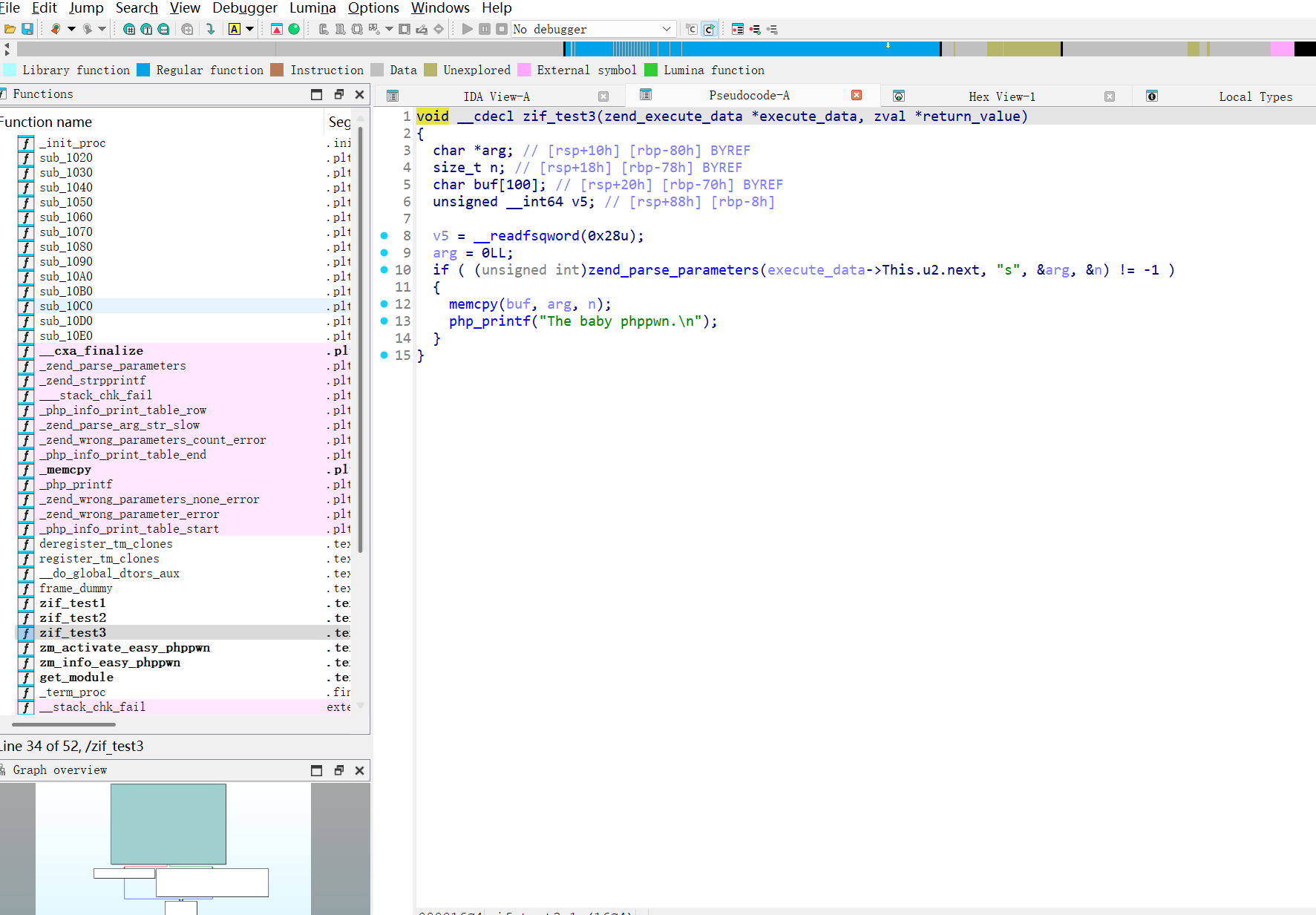
但是从题目来看,一般都是直接给的二进制文件,所以需要具体了解zend_parse_parameters的传参规则,这里的讲解不会涉及[底层细节](f43K9s2c8@1M7s2y4Q4x3@1q4Q4x3V1k6Q4x3V1k6%4N6%4N6Q4x3X3g2T1L8$3!0C8M7%4c8S2j5$3E0Q4x3X3g2U0L8W2)9J5c8Y4u0W2j5h3c8Q4x3V1k6H3K9s2l9%4i4K6u0V1K9h3&6@1k6i4u0F1j5h3I4Q4x3V1j5%4i4K6u0V1k6Y4g2F1j5#2)9J5k6h3#2V1i4K6t1K6y4#2)9J5k6e0k6Q4x3X3f1J5 %E5%87%BD%E6%95%B0%E5%8F%82%E6%95%B0%E8%A7%A3%E6%9E%90):
对于参数类型而言,常用参数对照表:
字符串类型解析:
在PHP 7中,字符串解析有两种形式:char*和zend_string。其中:
复合类型规范:
在实际使用中,可以将多个类型规范符组合使用,以表示多个参数的类型。例如:
可选参数:
在类型规范字符串中,可以使用|符号来表示后续的参数是可选的。例如:
但是很多时候都是直接用z来代替参数,在后面通常会有一个形如v15[8] == 6的比较操作,这实际上是在确定参数的类型:
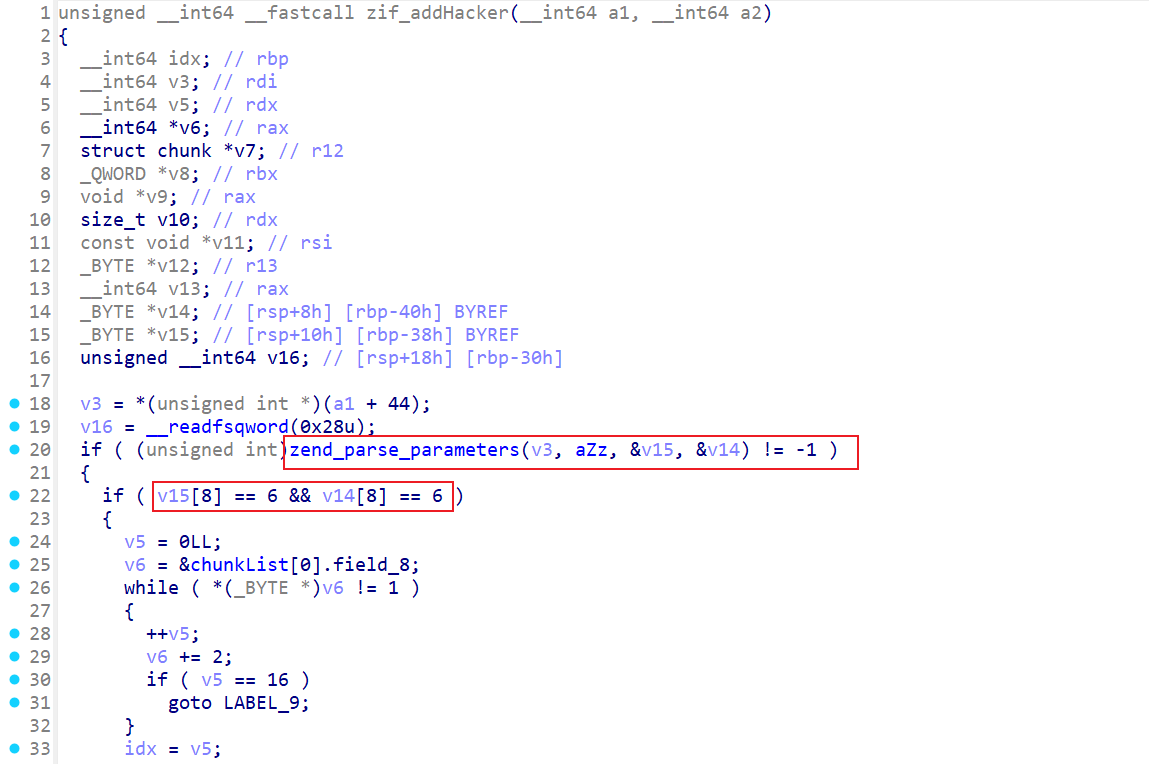
具体对应关系是:
ee4K9s2c8@1M7s2y4Q4x3@1q4Q4x3V1k6Q4x3V1k6Y4K9i4c8Z5N6h3u0Q4x3X3g2U0L8$3#2Q4x3V1k6H3K9s2m8Q4x3V1k6H3K9s2m8Q4x3X3c8K6M7X3y4Q4x3V1k6T1L8r3!0T1i4K6u0r3x3U0p5J5j5U0t1^5x3K6c8W2z5h3k6T1j5$3t1&6j5e0b7^5j5U0W2U0j5U0M7H3z5e0M7I4x3$3t1$3j5$3t1I4z5e0M7$3x3o6N6U0j5#2)9J5c8X3c8G2j5%4y4Q4x3V1k6K6L8%4g2J5j5$3g2Q4x3V1k6U0L8%4u0W2i4K6u0r3k6r3q4@1j5g2)9J5k6s2y4@1M7Y4g2U0N6s2g2J5k6i4y4Q4x3V1k6*7N6X3q4D9i4K6u0W2M7Y4y4@1
虽说是php的内存管理,但是实际上是其内部zend引擎的内存管理机制。PHP采取“预分配方案”,提前向操作系统申请一个chunk(2M,利用到hugepage特性),并且将这2M内存切割为不同规格(大小)的若干内存块,当程序申请内存时,直接查找现有的空闲内存块即可;
PHP将内存分配请求分为3种情况:
huge内存:针对大于2M-4K的分配请求,直接调用mmap分配;
large内存:针对小于2M-4K,大于3K的分配请求,在chunk上查找满足条件的若干个连续page;
small内存:针对小于3K的分配请求;PHP拿出若干个页切割为8字节大小的内存块,拿出若干个页切割为16字节大小的内存块,24字节,32字节等等,将其组织成若干个空闲链表;每当有分配请求时,只在对应的空闲链表获取一个内存块即可;
在large和small两类chunk的第一个page里,会存储chunk的控制信息,这个结构体是_zend_mm_chunk,所有的chunk会形成一个双向链表,zend_mm_page_map利用位图记录512个page的使用情况,0代表空闲,1代表已经分配。zend_mm_page_info通过uint32_t存储FLAG信息,
然后是\_zend\_mm\_heap,是chunk的上级管理结构,存储与堆分配相关的全局信息:
如果不方便看的话可以直接看gdb的结果:
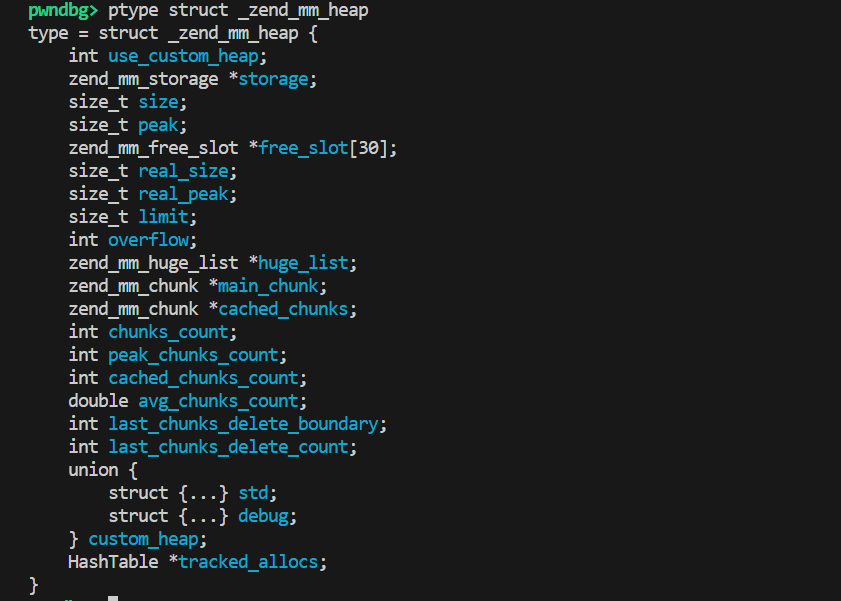
堆的最上层结构体是封装了zend_mm_heap的zend_alloc_globals:
alloc_globals是类似于glibc中main_arena的变量,通过它即可逐步获取整个堆:
这里只介绍small类型的内存分配,而这也是与我们攻击直接相关的部分。简单来说,small类型内存的空闲链表类似于2.27下的tcache空闲链表,也是单链表形式,并且没有任何保护,因此只需要修改链表中任一节点,即可劫持free的空闲链表。它的结构类似于:
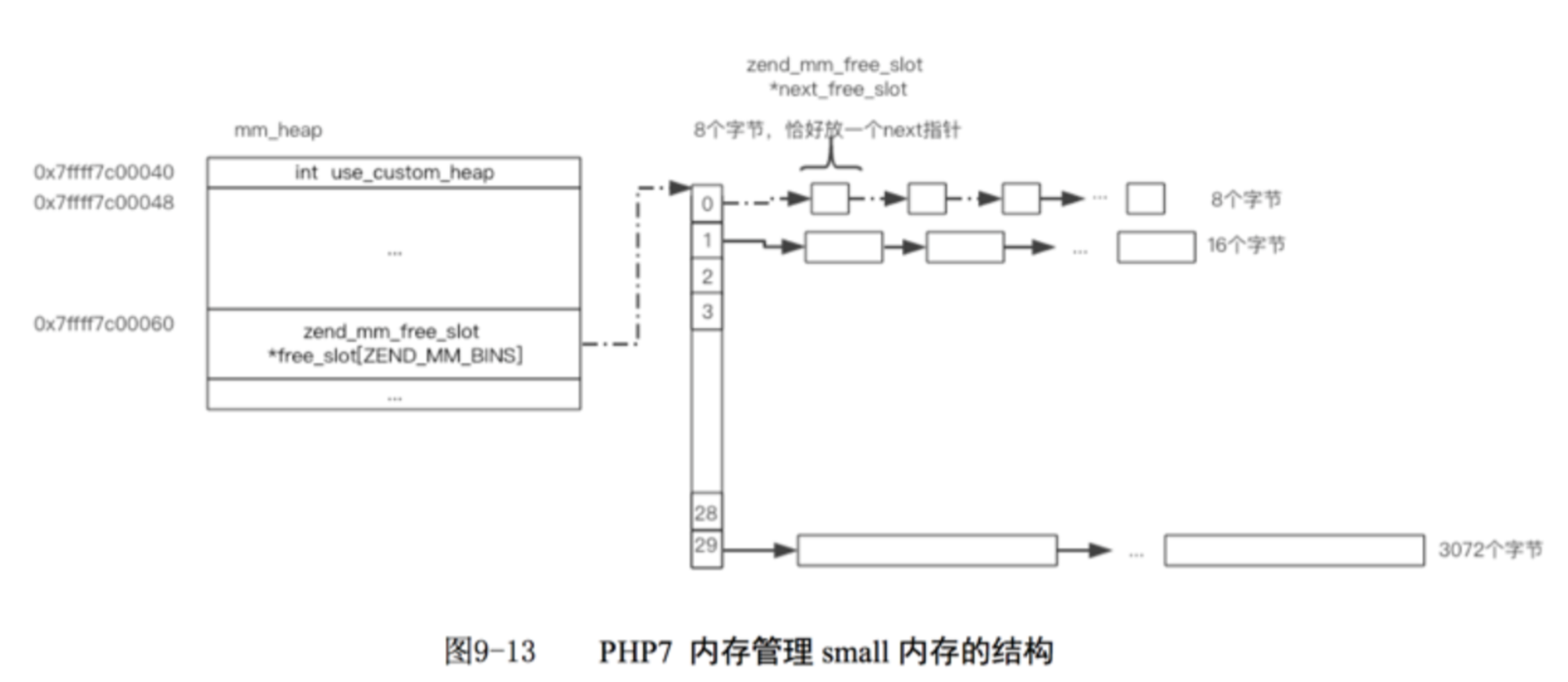
下面从源码来分析一下,当申请small类型heap时:
如果free_slot资源不够,则会调用zend_mm_alloc_small_slow创建一个对应大小的free_slot:
释放时,直接将free的small heap链入末尾:
网上没有搜到比较合适的,自己写了个phpgdb,目前支持4个命令。
运行到php加载完所有拓展之后,此时可以设置断点。
查看最上层的堆信息: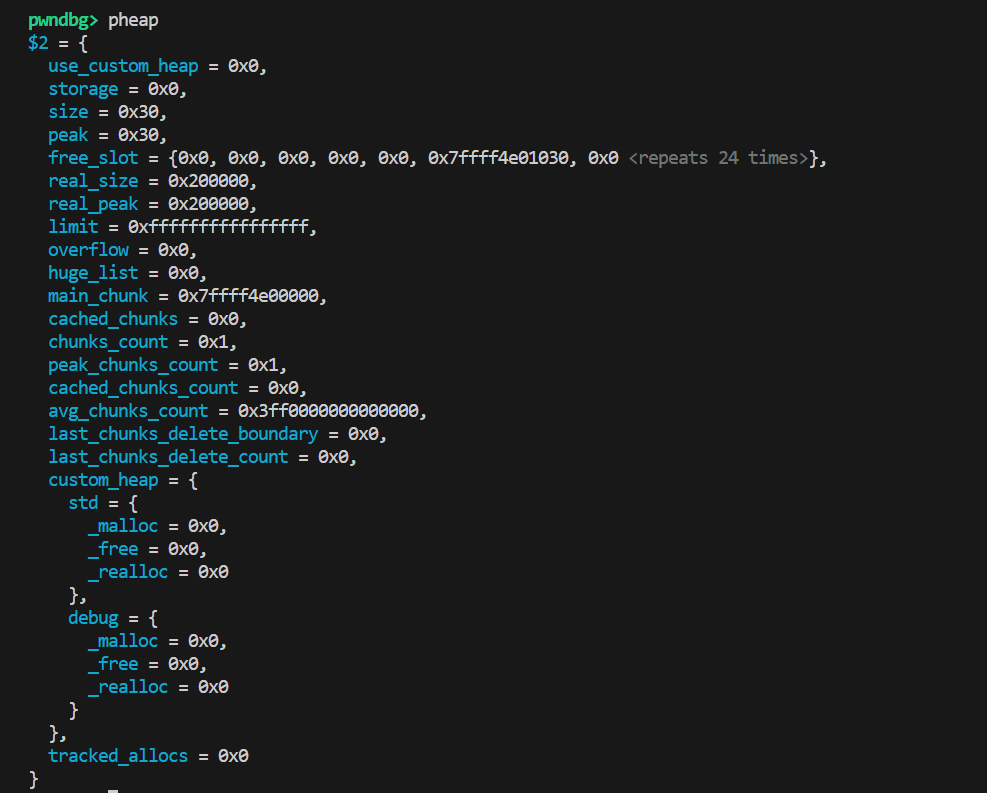
查看small slot链表:
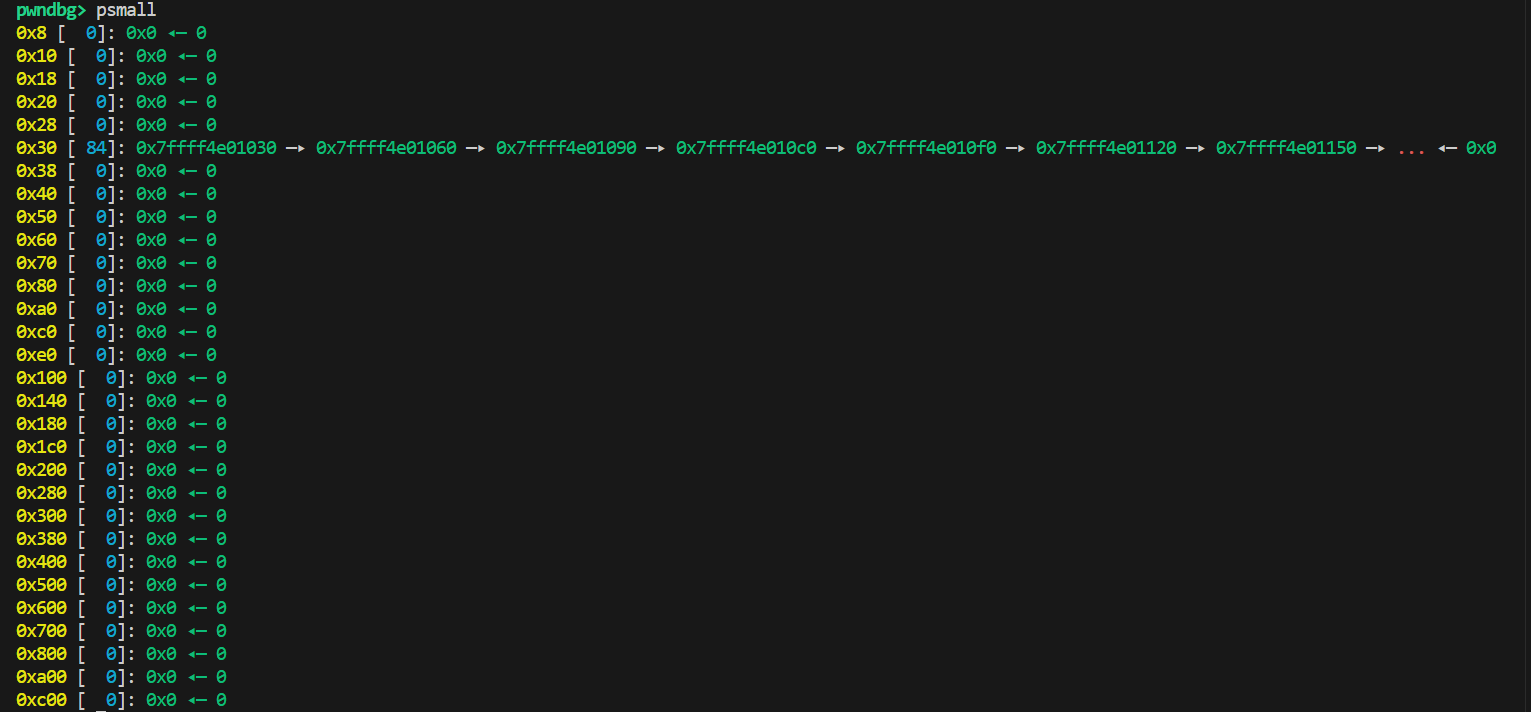
查看给定地址所属于的element(最终分配的堆块)
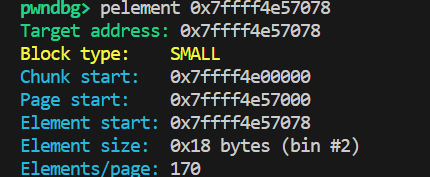
3b9K9s2c8@1M7s2y4Q4x3@1q4Q4x3V1k6Q4x3V1k6V1k6h3g2H3N6h3&6C8i4K6u0W2K9h3y4#2i4K6u0r3M7r3S2H3i4K6u0V1M7s2N6F1i4K6u0r3
456K9s2c8@1M7s2y4Q4x3@1q4Q4x3V1k6Q4x3V1k6%4N6%4N6Q4x3X3g2A6L8h3!0G2j5#2)9J5k6h3y4G2L8g2)9J5c8X3q4J5N6r3W2U0L8r3g2Q4x3V1j5#2x3e0p5J5y4l9`.`.
php类题型一般能够通过include包含文件,因此可以直接从/proc/self/maps中读出地址(其实vmmap命令就是在读这个文件):
一般而言,php拓展编译成动态链接库,默认编译选项下其got表是可写的,因此通常可以利用任意写劫持got表来劫持执行流。
一般php pwn都会在远程服务器运行一个php代码,很可能不能通过nc拿到交互的shell,因此通常执行反弹shell或者sendfile等。
php pwn部分就是泄露地址+溢出ret2libc,可以作为入门题目。
题目来源:De1CTF 2020
参考:b64K9s2c8@1M7s2y4Q4x3@1q4Q4x3V1k6Q4x3V1k6S2x3h3g2^5i4K6u0W2L8$3&6D9K9h3&6W2i4K6u0r3x3U0l9J5x3g2)9J5c8U0l9K6i4K6u0r3x3e0W2Q4x3V1k6%4k6h3u0H3N6$3&6Q4x3U0g2q4y4g2)9J5y4f1q4p5i4K6t1#2b7e0k6Q4x3U0g2q4y4q4)9J5y4f1t1&6i4K6t1#2b7e0m8Q4x3V1j5`.
题目来源:第一届“长城杯”信息安全铁人三项赛决 夺取闯关 pwn numbergame
分析给的numberGame.so文件,发现是一个类似堆题的增删改查功能,其中zif_show_chunk调用了一个自定义的_quicksort,漏洞点在这个位置:
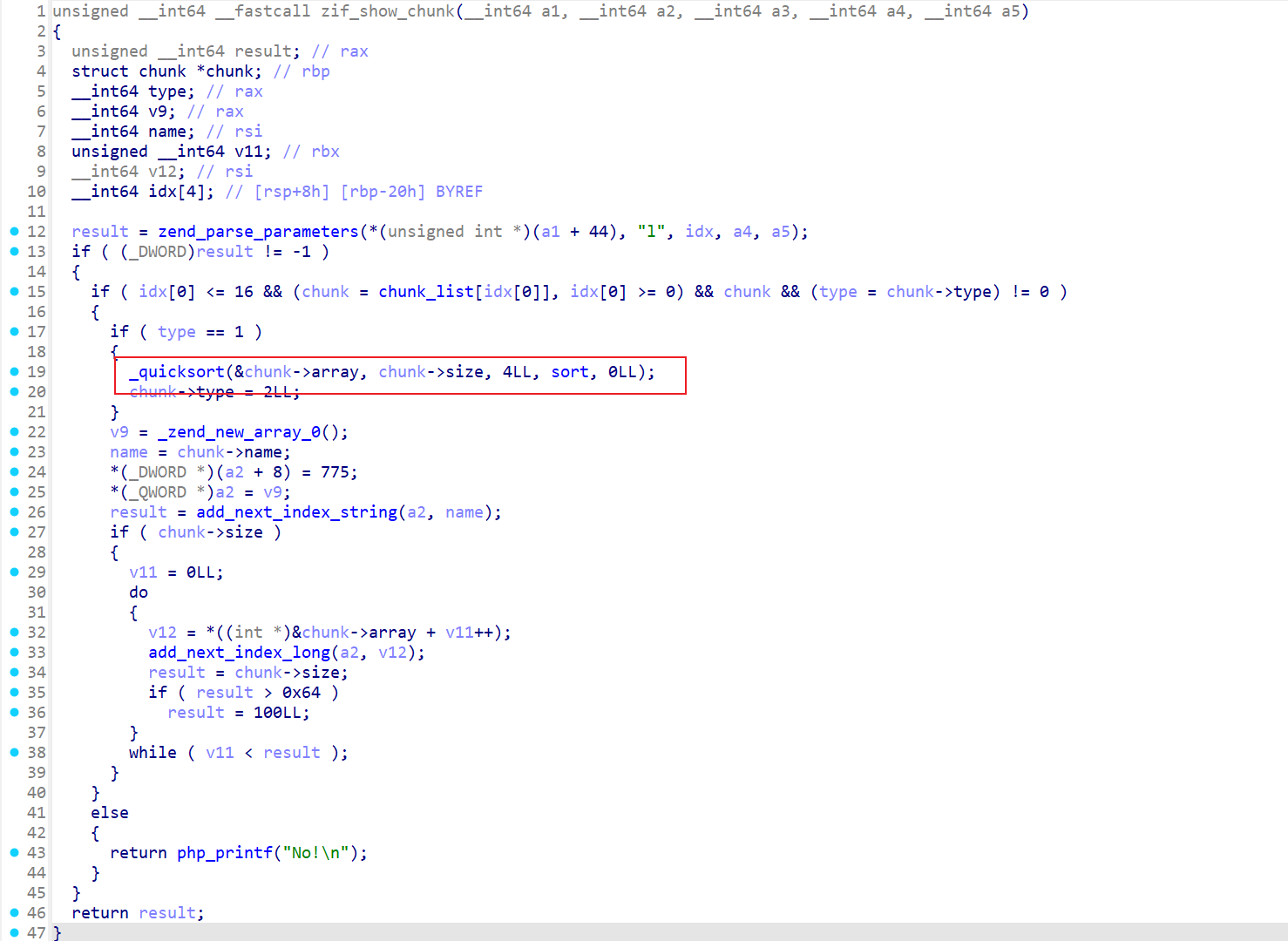
但是要去具体分析_quicksort的代码来找到漏洞形成原因会比较困难,这里使用LLM生成fuzz代码来把这个漏洞测出来:
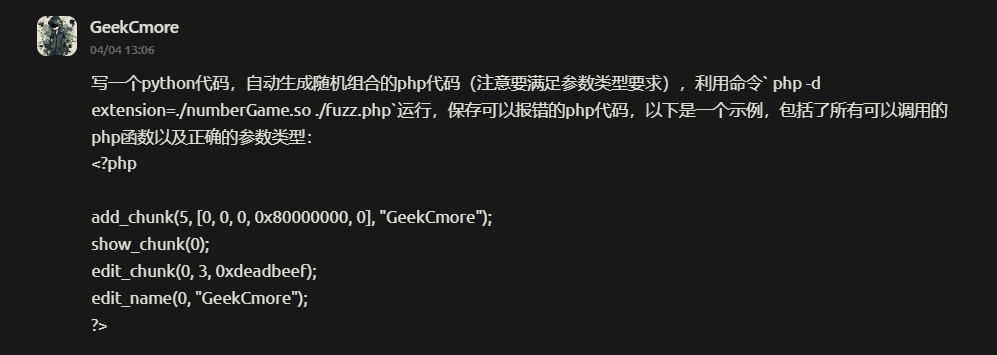
这是deepseek r1自动生成的代码,根据ida的代码可以进行细微的调整:
拿到代码不需要改,直接跑,几秒钟找到十几个error输入:
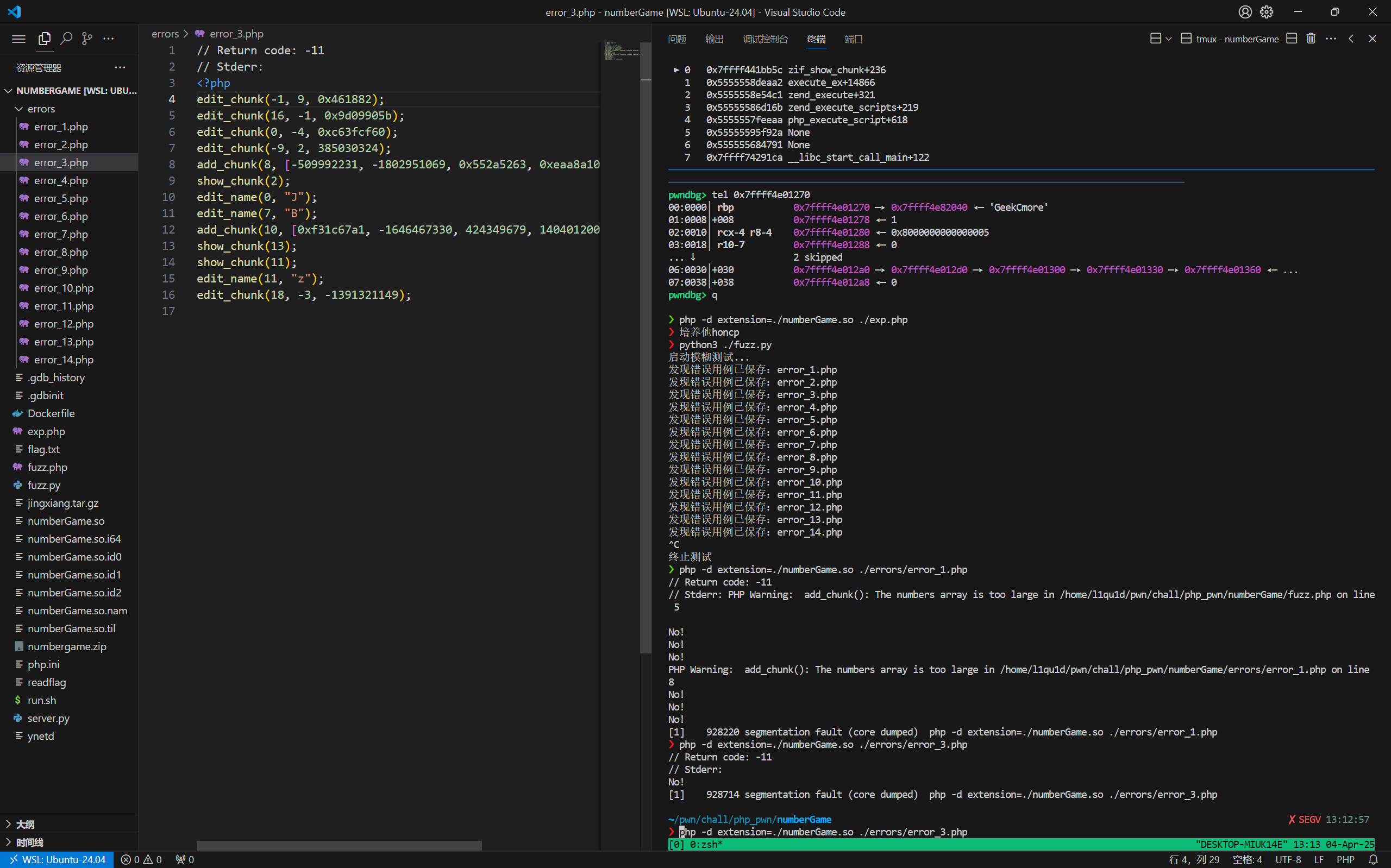
这个测试了一下,主要报错都是由于edit(16....)导致的,这个属于是没什么用的洞。在fuzz里把这个问题修一下,顺便改一改参数:
这样跑起来几分钟就可以测出段错误:
跑起来验证一下也就是_quicksort排序的时候越界的问题,把size修改得任意大了,甚至name字段也被覆盖了:
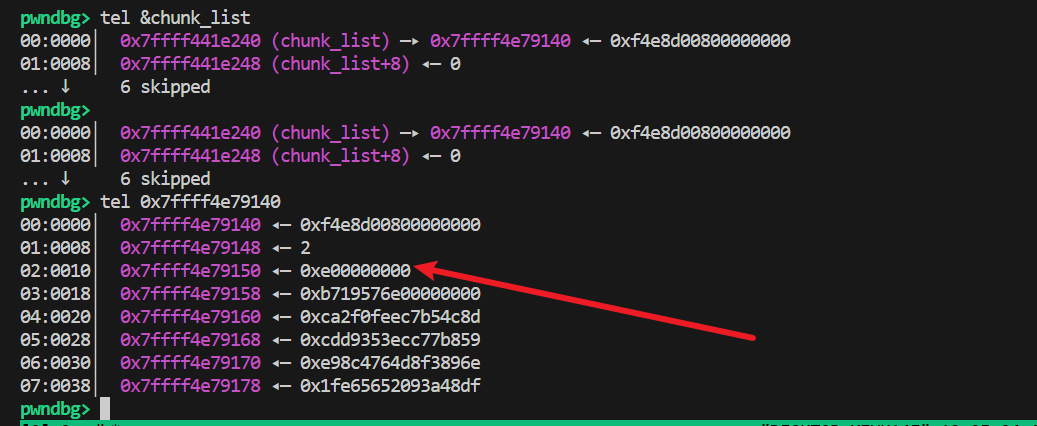
这个时候可以手工删减poc,以确定触发漏洞的输入:
这样就可以确定是排序导致的问题了,这个时候可以进一步针对这个数组序列构造fuzz:
这样跑起来就得到了很简单的poc:
会把size改大:

这样可以得到一个在php堆上的下溢任意地址写:
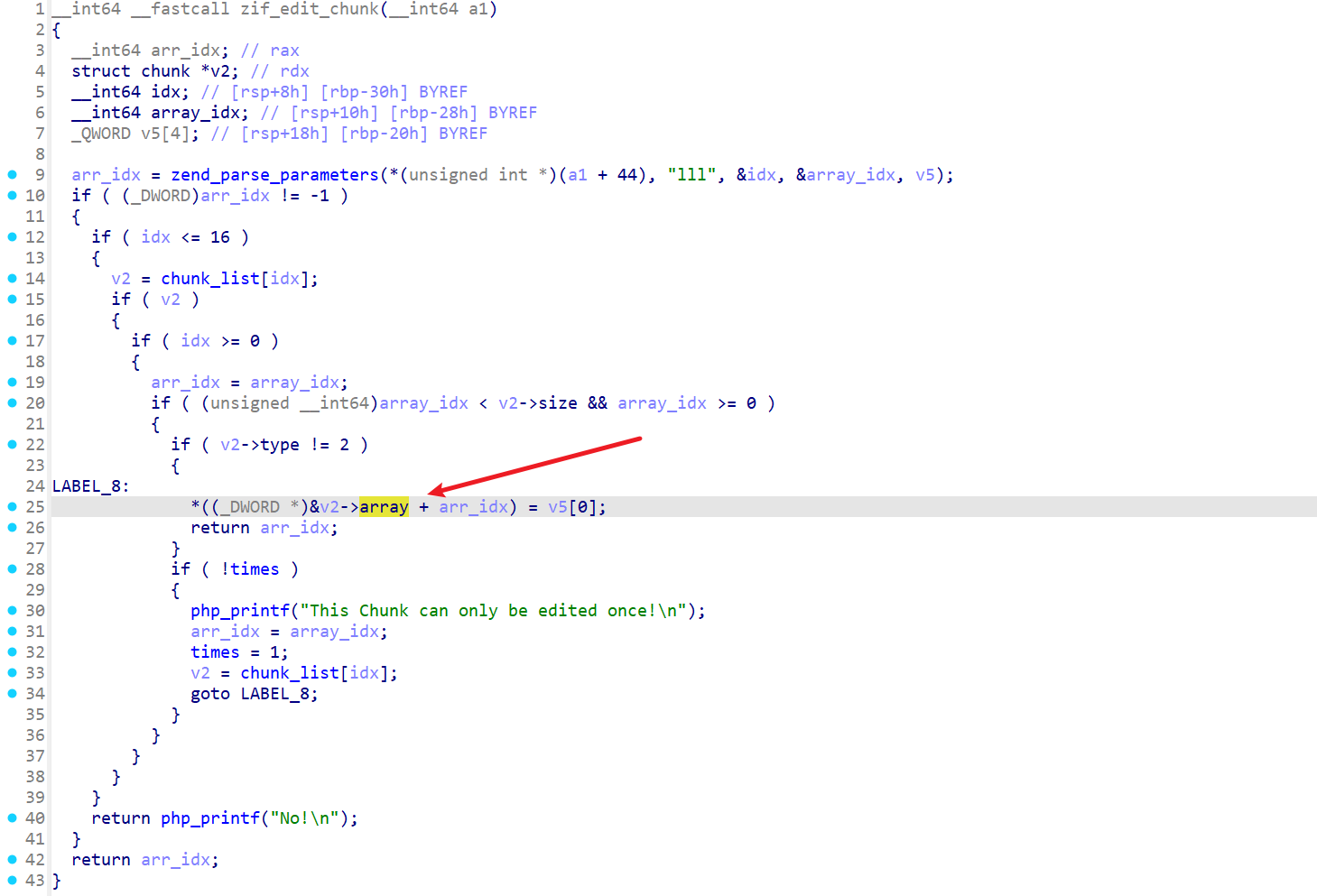
思路也比较简单,就是第一次利用越界写修改下一个chunk的name指针,再利用这个name指针实现任意地址写。这里给出直接打本地的脚本,远程同理:
题目还是一个典型的堆菜单,分析结构体有点抽象,感觉是为了埋洞之后方便利用搞的:

漏洞点是addHakcer的时候存在一个off by null的漏洞:
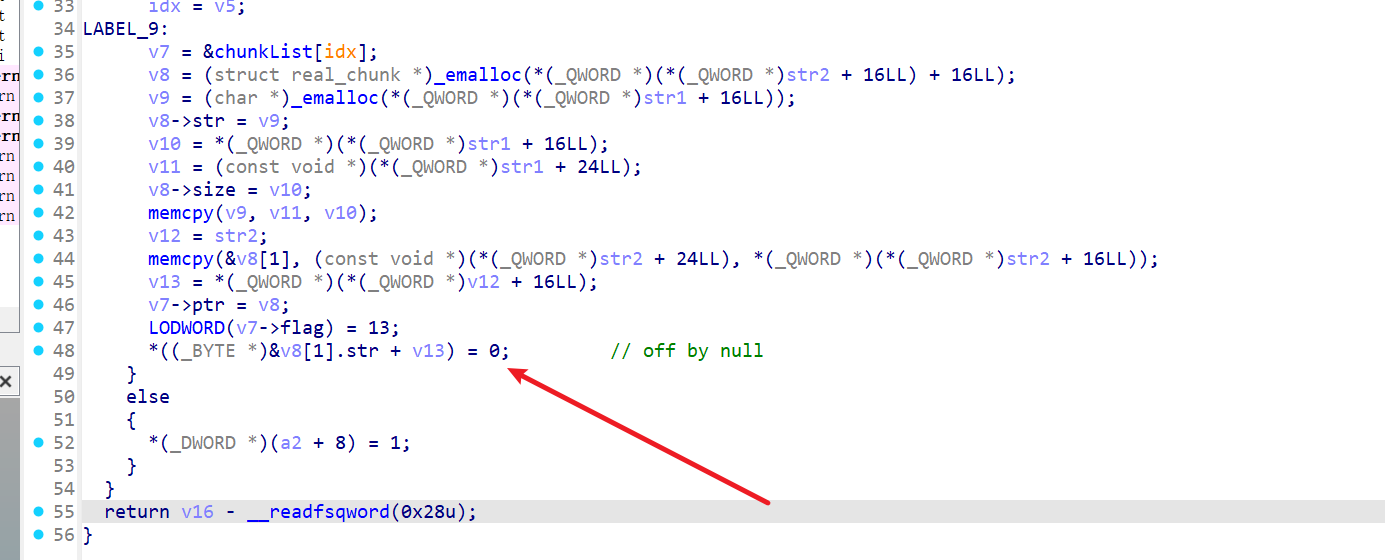
按照如下布局:
即可覆盖chunkList[1].ptr->str1_ptr:

结合editHacker的修改能力:
能在堆上进行一定的篡改:
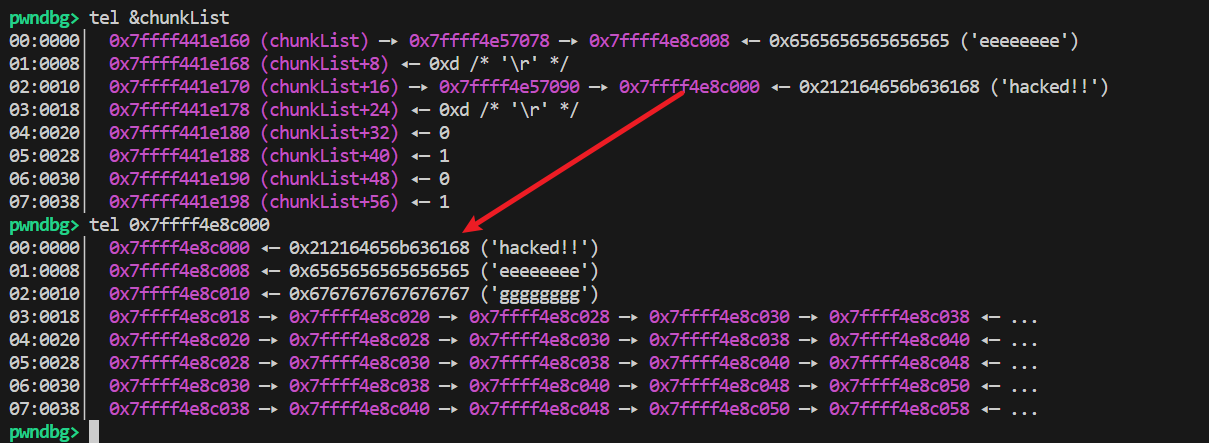
通过适当构造可以得到任意地址写:
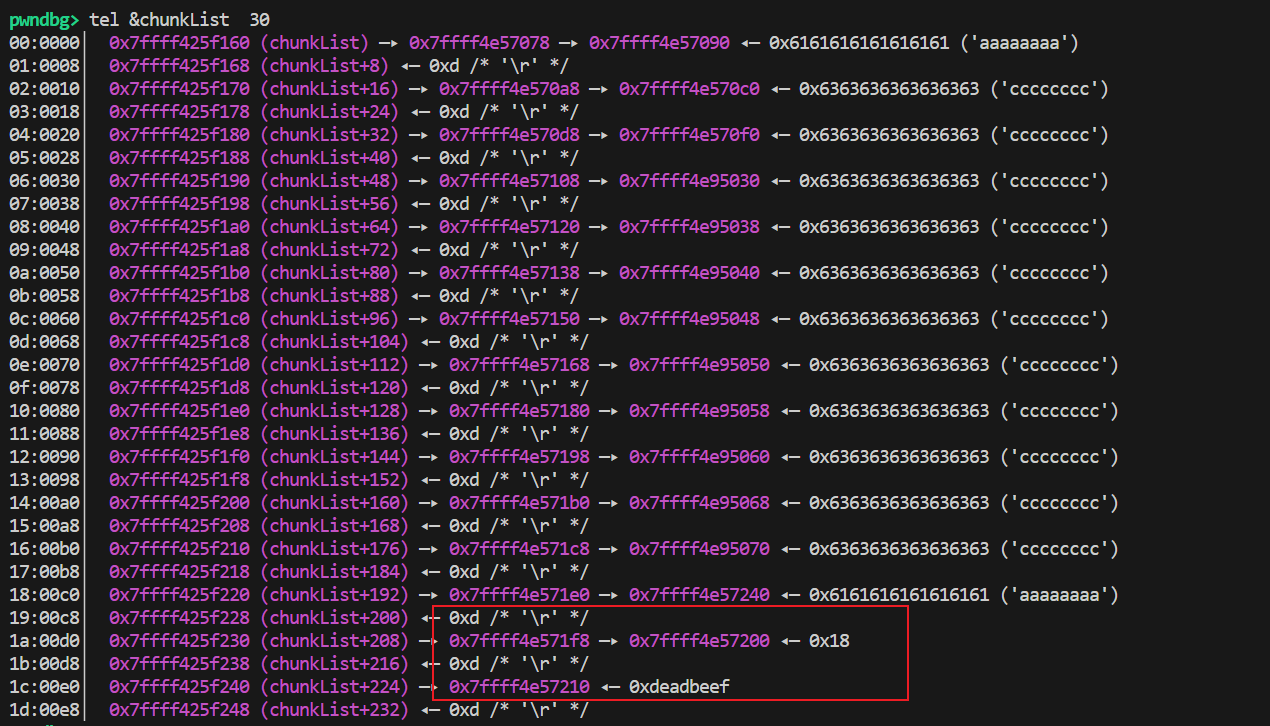
exp:
题目来源:D3CTF 2024 PwnShell
参考:d67K9s2c8@1M7s2y4Q4x3@1q4Q4x3V1k6Q4x3V1j5&6j5h3&6#2P5q4)9J5k6h3!0J5k6#2)9J5c8U0t1H3x3U0c8Q4x3V1j5H3y4q4)9J5c8U0t1&6i4K6u0r3k6o6y4U0N6r3j5J5x3o6t1@1i4K6u0r3K9h3&6V1k6i4S2Q4x3X3g2Z5N6r3#2D9
题目来源:D3CTF 2021 hackphp
参考:
484K9s2c8@1M7s2y4Q4x3@1q4Q4x3V1k6Q4x3V1k6Y4K9i4c8Z5N6h3u0Q4x3X3g2U0L8$3#2Q4x3V1k6g2c8g2y4#2M7r3g2J5c8$3q4@1k6g2)9J5c8V1b7K6b7#2c8r3i4K6u0V1f1$3!0#2M7X3y4W2i4K6u0r3j5X3I4G2j5W2)9J5c8X3#2S2M7%4c8W2M7W2)9J5c8X3S2S2j5$3E0H3K9s2m8Q4x3V1k6W2P5s2m8Q4x3X3g2H3K9s2l9`.
bf4K9s2c8@1M7s2y4Q4x3@1q4Q4x3V1k6Q4x3V1k6%4N6%4N6Q4x3X3g2S2L8Y4q4#2j5h3&6C8k6g2)9J5k6h3y4G2L8g2)9J5c8Y4m8G2M7%4c8Q4x3V1k6A6k6q4)9J5c8U0t1K6y4e0t1K6y4#2)9J5x3$3R3J5i4K6u0V1y4b7`.`.
题目来源:第二届长城杯半决赛 phpmaster
参考:https://bbs.kanxue.com/thread-286086.htm
700K9s2c8@1M7s2y4Q4x3@1q4Q4x3V1k6Q4x3V1k6%4N6%4N6Q4x3X3g2S2L8Y4q4#2j5h3&6C8k6g2)9J5k6h3y4G2L8g2)9J5c8Y4m8G2M7%4c8Q4x3V1k6A6k6q4)9J5c8U0t1H3y4o6b7H3y4l9`.`.
730K9s2c8@1M7s2y4Q4x3@1q4Q4x3V1k6Q4x3V1k6A6L8h3I4*7K9o6q4Q4x3X3g2Y4K9i4c8Z5N6h3u0Q4x3X3g2A6L8#2)9J5c8Y4m8G2M7%4c8K6i4K6u0r3f1p5S2b7i4K6u0V1f1$3!0Q4x3X3c8b7N6$3&6Q4x3V1k6Q4x3U0y4*7k6h3&6V1i4K6g2X3M7r3q4J5M7$3g2Q4y4h3k6H3j5i4u0S2L8h3g2@1k6i4u0K6
215K9s2c8@1M7s2y4Q4x3@1q4Q4x3V1k6Q4x3V1k6%4N6%4N6Q4x3X3g2T1L8$3!0C8M7%4c8S2j5$3E0Q4x3X3g2U0L8W2)9J5c8Y4u0W2j5h3c8Q4x3V1k6H3K9s2l9%4i4K6u0V1K9h3&6@1k6i4u0F1j5h3I4Q4x3V1j5%4i4K6u0V1K9h3#2H3L8r3g2E0k6h3&6@1i4K6u0W2L8h3b7`.
a99K9s2c8@1M7s2y4Q4x3@1q4Q4x3V1k6Q4x3V1k6^5N6h3q4F1P5s2g2S2L8X3u0D9K9h3&6Y4j5X3I4A6L8X3N6Q4x3X3g2Y4K9i4c8Z5N6h3u0Q4x3X3g2A6L8#2)9J5c8X3y4@1k6W2)9J5c8Y4m8%4L8W2)9J5c8U0t1H3x3U0m8Q4x3V1j5H3y4g2)9J5c8U0l9#2i4K6u0r3L8h3W2^5N6s2g2J5k6g2)9J5c8R3`.`.
fa9K9s2c8@1M7s2y4Q4x3@1q4Q4x3V1k6Q4x3V1k6H3j5h3&6Q4x3X3g2T1j5h3W2V1N6g2)9J5k6h3y4G2L8g2)9J5c8Y4y4Q4x3V1j5I4P5W2g2G2K9e0M7$3P5e0g2y4L8#2g2a6h3g2m8K6g2W2k6K9N6X3&6E0f1g2)9K6c8Y4m8%4k6q4)9K6c8s2R3@1z5h3j5`.
❯ sudo apt install php php-dev
❯ php -v
PHP 8.3.6 (cli) (built: Mar 19 2025 10:08:38) (NTS)Copyright (c) The PHP GroupZend Engine v4.3.6, Copyright (c) Zend Technologies with Zend OPcache v8.3.6, Copyright (c), by Zend Technologies
❯ sudo apt install php php-dev
❯ php -v
PHP 8.3.6 (cli) (built: Mar 19 2025 10:08:38) (NTS)Copyright (c) The PHP GroupZend Engine v4.3.6, Copyright (c) Zend Technologies with Zend OPcache v8.3.6, Copyright (c), by Zend Technologies
$ git clone https://github.com/php/php-src.git \
--branch=PHP-8.3.15
$ cd php-src
$ ./buildconf --force
$ ./configure \
--enable-cli \
--enable-debug
$ make && make test && make install
$ git clone https://github.com/php/php-src.git \
--branch=PHP-8.3.15
$ cd php-src
$ ./buildconf --force
$ ./configure \
--enable-cli \
--enable-debug
$ make && make test && make install
❯ php ./ext/ext_skel.php --ext easy_phppwn --onlyunix
Copying config scripts... done
Copying sources... done
Copying tests... done
Success. The extension is now ready to be compiled. To do so, use the
following steps:cd /home/l1qu1d/pwn/chall/php_pwn/php_test/php-src-php-8.3.15/ext/easy_phppwn
phpize./configure
makeDon't forget to run tests once the compilation is done:
make test
Thank you for using PHP!
❯ php ./ext/ext_skel.php --ext easy_phppwn --onlyunix
Copying config scripts... done
Copying sources... done
Copying tests... done
Success. The extension is now ready to be compiled. To do so, use the
following steps:cd /home/l1qu1d/pwn/chall/php_pwn/php_test/php-src-php-8.3.15/ext/easy_phppwn
phpize./configure
makeDon't forget to run tests once the compilation is done:
make test
Thank you for using PHP!
❯ tree ./easy_phppwn./easy_phppwn├── config.m4├── easy_phppwn.c├── easy_phppwn.stub.php├── easy_phppwn_arginfo.h├── php_easy_phppwn.h└── tests ├── 001.phpt
├── 002.phpt
└── 003.phpt
2 directories, 8 files❯ tree ./easy_phppwn./easy_phppwn├── config.m4├── easy_phppwn.c├── easy_phppwn.stub.php├── easy_phppwn_arginfo.h├── php_easy_phppwn.h└── tests ├── 001.phpt
├── 002.phpt
└── 003.phpt
2 directories, 8 files<?php/** * @generate-class-entries
* @undocumentable
*/
function test1(): void {}
function test2(string $str = ""): string {}
function test3(string $name): string {}
<?php/** * @generate-class-entries
* @undocumentable
*/
function test1(): void {}
function test2(string $str = ""): string {}
function test3(string $name): string {}
php ../../build/gen_stub.php --ext=easy_phppwn ./easy_phppwn.stub.phpphp ../../build/gen_stub.php --ext=easy_phppwn ./easy_phppwn.stub.phpPHP_FUNCTION(test3){ char *arg = NULL;
size_t arg_len, len;
char buf[100];
if (zend_parse_parameters(ZEND_NUM_ARGS(), "s", &arg, &arg_len) == FAILURE) {
return;
}
memcpy(buf, arg, arg_len);
php_printf("The baby phppwn.\n");
return SUCCESS;
}PHP_FUNCTION(test3){ char *arg = NULL;
size_t arg_len, len;
char buf[100];
if (zend_parse_parameters(ZEND_NUM_ARGS(), "s", &arg, &arg_len) == FAILURE) {
return;
}
memcpy(buf, arg, arg_len);
php_printf("The baby phppwn.\n");
return SUCCESS;
}❯ phpizeConfiguring for:
PHP Api Version: 20230831Zend Module Api No: 20230831Zend Extension Api No: 420230831configure.ac:165: warning: The macro `AC_PROG_LIBTOOL' is obsolete.configure.ac:165: You should run autoupdate.build/libtool.m4:100: AC_PROG_LIBTOOL is expanded from...
configure.ac:165: the top level
❯ ./configure --with-php-config=/usr/bin/php-config
...❯ make
❯ phpizeConfiguring for:
PHP Api Version: 20230831Zend Module Api No: 20230831Zend Extension Api No: 420230831configure.ac:165: warning: The macro `AC_PROG_LIBTOOL' is obsolete.configure.ac:165: You should run autoupdate.build/libtool.m4:100: AC_PROG_LIBTOOL is expanded from...
configure.ac:165: the top level
❯ ./configure --with-php-config=/usr/bin/php-config
...❯ make
php -i | grep -i extension_dir
php -i | grep -i extension_dir
php -d extension=./modules/easy_phppwn.so test.php
php -d extension=./modules/easy_phppwn.so test.php
<?phptest1();?><?phptest1();?>❯ php -d extension=./modules/easy_phppwn.so test.php
The extension easy_phppwn is loaded and working!❯ php -d extension=./modules/easy_phppwn.so test.php
The extension easy_phppwn is loaded and working!gdb --args php -d extension=./modules/easy_phppwn.so test.php
gdb --args php -d extension=./modules/easy_phppwn.so test.php
zend_parse_parameters(int num_args, const char *type_spec, ...);zend_parse_parameters(int num_args, const char *type_spec, ...);| 类型规范符 | 对应的C语言类型 | 说明 |
|---|---|---|
b或i |
int | 整数类型,b通常表示bool类型,而i表示int类型 |
l |
long | 长整型 |
d |
double | 浮点数类型 |
s |
char* | 字符串,表示C语言中的字符指针 |
S |
zend_string | PHP 7中的 zend_string 类型字符串 |
a |
zval* | PHP数组类型 |
o |
zval* | PHP对象类型 |
r |
zval* | PHP资源类型 |
z |
zval* | PHP变量(可以是任何类型) |
N |
无 | 表示参数为NULL |
#define IS_UNDEF 0 /* A variable that was never written to. */#define IS_NULL 1#define IS_FALSE 2#define IS_TRUE 3#define IS_LONG 4 /* An integer value. */#define IS_DOUBLE 5 /* A floating point value. */#define IS_STRING 6#define IS_ARRAY 7#define IS_OBJECT 8#define IS_RESOURCE 9#define IS_REFERENCE 10#define IS_UNDEF 0 /* A variable that was never written to. */#define IS_NULL 1#define IS_FALSE 2#define IS_TRUE 3#define IS_LONG 4 /* An integer value. */#define IS_DOUBLE 5 /* A floating point value. */#define IS_STRING 6#define IS_ARRAY 7#define IS_OBJECT 8#define IS_RESOURCE 9#define IS_REFERENCE 10struct _zend_mm_chunk {
zend_mm_heap *heap;
zend_mm_chunk *next;
zend_mm_chunk *prev;
uint32_t free_pages; /* number of free pages */
uint32_t free_tail; /* number of free pages at the end of chunk */
uint32_t num;
char reserve[64 - (sizeof(void*) * 3 + sizeof(uint32_t) * 3)];
zend_mm_heap heap_slot; /* used only in main chunk */
zend_mm_page_map free_map; /* 512 bits or 64 bytes */
zend_mm_page_info map[ZEND_MM_PAGES]; /* 2 KB = 512 * 4 */
};struct _zend_mm_chunk {
zend_mm_heap *heap;
zend_mm_chunk *next;
zend_mm_chunk *prev;
uint32_t free_pages; /* number of free pages */
uint32_t free_tail; /* number of free pages at the end of chunk */
uint32_t num;
char reserve[64 - (sizeof(void*) * 3 + sizeof(uint32_t) * 3)];
zend_mm_heap heap_slot; /* used only in main chunk */
zend_mm_page_map free_map; /* 512 bits or 64 bytes */
zend_mm_page_info map[ZEND_MM_PAGES]; /* 2 KB = 512 * 4 */
};struct _zend_mm_heap {
#if ZEND_MM_CUSTOM int use_custom_heap;
#endif#if ZEND_MM_STORAGE zend_mm_storage *storage;
#endif#if ZEND_MM_STAT size_t size; /* current memory usage */
size_t peak; /* peak memory usage */
#endif uintptr_t shadow_key; /* free slot shadow ptr xor key */
zend_mm_free_slot *free_slot[ZEND_MM_BINS]; /* free lists for small sizes */
#if ZEND_MM_STAT || ZEND_MM_LIMIT size_t real_size; /* current size of allocated pages */
#endif#if ZEND_MM_STAT size_t real_peak; /* peak size of allocated pages */
#endif#if ZEND_MM_LIMIT size_t limit; /* memory limit */
int overflow; /* memory overflow flag */
#endif zend_mm_huge_list *huge_list; /* list of huge allocated blocks */
zend_mm_chunk *main_chunk;
zend_mm_chunk *cached_chunks; /* list of unused chunks */
int chunks_count; /* number of allocated chunks */
int peak_chunks_count; /* peak number of allocated chunks for current request */
int cached_chunks_count; /* number of cached chunks */
double avg_chunks_count; /* average number of chunks allocated per request */
int last_chunks_delete_boundary; /* number of chunks after last deletion */
int last_chunks_delete_count; /* number of deletion over the last boundary */
#if ZEND_MM_CUSTOM struct {
void *(*_malloc)(size_t ZEND_FILE_LINE_DC ZEND_FILE_LINE_ORIG_DC);
void (*_free)(void* ZEND_FILE_LINE_DC ZEND_FILE_LINE_ORIG_DC);
void *(*_realloc)(void*, size_t ZEND_FILE_LINE_DC ZEND_FILE_LINE_ORIG_DC);
size_t (*_gc)(void);
void (*_shutdown)(bool full, bool silent);
} custom_heap;
union {
HashTable *tracked_allocs;
struct {
bool poison_alloc;
uint8_t poison_alloc_value;
bool poison_free;
uint8_t poison_free_value;
uint8_t padding;
bool check_freelists_on_shutdown;
} debug;
};
#endif pid_t pid;
zend_random_bytes_insecure_state rand_state;
};struct _zend_mm_heap {
#if ZEND_MM_CUSTOM int use_custom_heap;
#endif#if ZEND_MM_STORAGE zend_mm_storage *storage;
#endif#if ZEND_MM_STAT size_t size; /* current memory usage */
size_t peak; /* peak memory usage */
#endif uintptr_t shadow_key; /* free slot shadow ptr xor key */
zend_mm_free_slot *free_slot[ZEND_MM_BINS]; /* free lists for small sizes */
#if ZEND_MM_STAT || ZEND_MM_LIMIT size_t real_size; /* current size of allocated pages */
#endif#if ZEND_MM_STAT size_t real_peak; /* peak size of allocated pages */
#endif#if ZEND_MM_LIMIT size_t limit; /* memory limit */
int overflow; /* memory overflow flag */
#endif zend_mm_huge_list *huge_list; /* list of huge allocated blocks */
zend_mm_chunk *main_chunk;
zend_mm_chunk *cached_chunks; /* list of unused chunks */
int chunks_count; /* number of allocated chunks */
int peak_chunks_count; /* peak number of allocated chunks for current request */
int cached_chunks_count; /* number of cached chunks */
double avg_chunks_count; /* average number of chunks allocated per request */
int last_chunks_delete_boundary; /* number of chunks after last deletion */
int last_chunks_delete_count; /* number of deletion over the last boundary */
#if ZEND_MM_CUSTOM struct {
void *(*_malloc)(size_t ZEND_FILE_LINE_DC ZEND_FILE_LINE_ORIG_DC);
void (*_free)(void* ZEND_FILE_LINE_DC ZEND_FILE_LINE_ORIG_DC);
void *(*_realloc)(void*, size_t ZEND_FILE_LINE_DC ZEND_FILE_LINE_ORIG_DC);
size_t (*_gc)(void);
void (*_shutdown)(bool full, bool silent);
} custom_heap;
union {
HashTable *tracked_allocs;
struct {
bool poison_alloc;
uint8_t poison_alloc_value;
bool poison_free;
uint8_t poison_free_value;
uint8_t padding;
bool check_freelists_on_shutdown;
} debug;
};
#endif pid_t pid;
zend_random_bytes_insecure_state rand_state;
};typedef struct _zend_alloc_globals {
zend_mm_heap *mm_heap;
} zend_alloc_globals;typedef struct _zend_alloc_globals {
zend_mm_heap *mm_heap;
} zend_alloc_globals;static zend_alloc_globals alloc_globals;
static zend_alloc_globals alloc_globals;
static zend_always_inline void *zend_mm_alloc_small(zend_mm_heap *heap, int bin_num ZEND_FILE_LINE_DC ZEND_FILE_LINE_ORIG_DC)
{#if ZEND_MM_STAT do {
size_t size = heap->size + bin_data_size[bin_num];
size_t peak = MAX(heap->peak, size);
heap->size = size;
heap->peak = peak;
} while (0);
#endif if (EXPECTED(heap->free_slot[bin_num] != NULL)) {
zend_mm_free_slot *p = heap->free_slot[bin_num];
heap->free_slot[bin_num] = p->next_free_slot;
return p;
} else {
return zend_mm_alloc_small_slow(heap, bin_num ZEND_FILE_LINE_RELAY_CC ZEND_FILE_LINE_ORIG_RELAY_CC);
}
}static zend_always_inline void *zend_mm_alloc_small(zend_mm_heap *heap, int bin_num ZEND_FILE_LINE_DC ZEND_FILE_LINE_ORIG_DC)
{#if ZEND_MM_STAT do {
size_t size = heap->size + bin_data_size[bin_num];
size_t peak = MAX(heap->peak, size);
heap->size = size;
heap->peak = peak;
} while (0);
#endif if (EXPECTED(heap->free_slot[bin_num] != NULL)) {
zend_mm_free_slot *p = heap->free_slot[bin_num];
heap->free_slot[bin_num] = p->next_free_slot;
return p;
} else {
return zend_mm_alloc_small_slow(heap, bin_num ZEND_FILE_LINE_RELAY_CC ZEND_FILE_LINE_ORIG_RELAY_CC);
}
}static zend_never_inline void *zend_mm_alloc_small_slow(zend_mm_heap *heap, uint32_t bin_num ZEND_FILE_LINE_DC ZEND_FILE_LINE_ORIG_DC)
{ zend_mm_chunk *chunk;
int page_num;
zend_mm_bin *bin;
zend_mm_free_slot *p, *end;
#if ZEND_DEBUG bin = (zend_mm_bin*)zend_mm_alloc_pages(heap, bin_pages[bin_num], bin_data_size[bin_num] ZEND_FILE_LINE_RELAY_CC ZEND_FILE_LINE_ORIG_RELAY_CC);
#else bin = (zend_mm_bin*)zend_mm_alloc_pages(heap, bin_pages[bin_num] ZEND_FILE_LINE_RELAY_CC ZEND_FILE_LINE_ORIG_RELAY_CC);
#endif if (UNEXPECTED(bin == NULL)) {
/* insufficient memory */
return NULL;
}
chunk = (zend_mm_chunk*)ZEND_MM_ALIGNED_BASE(bin, ZEND_MM_CHUNK_SIZE);
page_num = ZEND_MM_ALIGNED_OFFSET(bin, ZEND_MM_CHUNK_SIZE) / ZEND_MM_PAGE_SIZE;
chunk->map[page_num] = ZEND_MM_SRUN(bin_num);
if (bin_pages[bin_num] > 1) {
uint32_t i = 1;
do {
chunk->map[page_num+i] = ZEND_MM_NRUN(bin_num, i);
i++;
} while (i < bin_pages[bin_num]);
}
/* create a linked list of elements from 1 to last */
end = (zend_mm_free_slot*)((char*)bin + (bin_data_size[bin_num] * (bin_elements[bin_num] - 1)));
heap->free_slot[bin_num] = p = (zend_mm_free_slot*)((char*)bin + bin_data_size[bin_num]);
do {
zend_mm_set_next_free_slot(heap, bin_num, p, (zend_mm_free_slot*)((char*)p + bin_data_size[bin_num]));
#if ZEND_DEBUG do {
zend_mm_debug_info *dbg = (zend_mm_debug_info*)((char*)p + bin_data_size[bin_num] - ZEND_MM_ALIGNED_SIZE(sizeof(zend_mm_debug_info)));
dbg->size = 0;
} while (0);
#endif p = (zend_mm_free_slot*)((char*)p + bin_data_size[bin_num]);
} while (p != end);
/* terminate list using NULL */
p->next_free_slot = NULL;
#if ZEND_DEBUG do {
zend_mm_debug_info *dbg = (zend_mm_debug_info*)((char*)p + bin_data_size[bin_num] - ZEND_MM_ALIGNED_SIZE(sizeof(zend_mm_debug_info)));
dbg->size = 0;
} while (0);
#endif /* return first element */
return bin;
}static zend_never_inline void *zend_mm_alloc_small_slow(zend_mm_heap *heap, uint32_t bin_num ZEND_FILE_LINE_DC ZEND_FILE_LINE_ORIG_DC)
{ zend_mm_chunk *chunk;
int page_num;
zend_mm_bin *bin;
zend_mm_free_slot *p, *end;
#if ZEND_DEBUG bin = (zend_mm_bin*)zend_mm_alloc_pages(heap, bin_pages[bin_num], bin_data_size[bin_num] ZEND_FILE_LINE_RELAY_CC ZEND_FILE_LINE_ORIG_RELAY_CC);
#else bin = (zend_mm_bin*)zend_mm_alloc_pages(heap, bin_pages[bin_num] ZEND_FILE_LINE_RELAY_CC ZEND_FILE_LINE_ORIG_RELAY_CC);
#endif if (UNEXPECTED(bin == NULL)) {
/* insufficient memory */
return NULL;
}
chunk = (zend_mm_chunk*)ZEND_MM_ALIGNED_BASE(bin, ZEND_MM_CHUNK_SIZE);
page_num = ZEND_MM_ALIGNED_OFFSET(bin, ZEND_MM_CHUNK_SIZE) / ZEND_MM_PAGE_SIZE;
chunk->map[page_num] = ZEND_MM_SRUN(bin_num);
if (bin_pages[bin_num] > 1) {
uint32_t i = 1;
do {
chunk->map[page_num+i] = ZEND_MM_NRUN(bin_num, i);
i++;
} while (i < bin_pages[bin_num]);
}
/* create a linked list of elements from 1 to last */
end = (zend_mm_free_slot*)((char*)bin + (bin_data_size[bin_num] * (bin_elements[bin_num] - 1)));
heap->free_slot[bin_num] = p = (zend_mm_free_slot*)((char*)bin + bin_data_size[bin_num]);
do {
zend_mm_set_next_free_slot(heap, bin_num, p, (zend_mm_free_slot*)((char*)p + bin_data_size[bin_num]));
#if ZEND_DEBUG do {
zend_mm_debug_info *dbg = (zend_mm_debug_info*)((char*)p + bin_data_size[bin_num] - ZEND_MM_ALIGNED_SIZE(sizeof(zend_mm_debug_info)));
dbg->size = 0;
} while (0);
#endif p = (zend_mm_free_slot*)((char*)p + bin_data_size[bin_num]);
} while (p != end);
/* terminate list using NULL */
p->next_free_slot = NULL;
#if ZEND_DEBUG do {
zend_mm_debug_info *dbg = (zend_mm_debug_info*)((char*)p + bin_data_size[bin_num] - ZEND_MM_ALIGNED_SIZE(sizeof(zend_mm_debug_info)));
dbg->size = 0;
} while (0);
#endif /* return first element */
return bin;
}static zend_always_inline void zend_mm_free_small(zend_mm_heap *heap, void *ptr, int bin_num)
{ ZEND_ASSERT(bin_data_size[bin_num] >= ZEND_MM_MIN_USEABLE_BIN_SIZE);
zend_mm_free_slot *p;
#if ZEND_MM_STAT heap->size -= bin_data_size[bin_num];
#endif#if ZEND_DEBUG do {
zend_mm_debug_info *dbg = (zend_mm_debug_info*)((char*)ptr + bin_data_size[bin_num] - ZEND_MM_ALIGNED_SIZE(sizeof(zend_mm_debug_info)));
dbg->size = 0;
} while (0);
#endif p = (zend_mm_free_slot*)ptr;
zend_mm_set_next_free_slot(heap, bin_num, p, heap->free_slot[bin_num]);
heap->free_slot[bin_num] = p;
}static zend_always_inline void zend_mm_free_small(zend_mm_heap *heap, void *ptr, int bin_num)
{ ZEND_ASSERT(bin_data_size[bin_num] >= ZEND_MM_MIN_USEABLE_BIN_SIZE);
zend_mm_free_slot *p;
更多【Pwn-php pwn分析与phpgdb插件】相关视频教程:www.yxfzedu.com
相关文章推荐
- 编程技术-ES使用ik分词器查看分词结果及自定义词汇 - 其他
- asp.net-asp.net水资源检测系统VS开发sqlserver数据库web结构c#编程Microsoft Visual Studio - 其他
- 编程技术-jQuery中遍历元素each - 其他
- 编程技术-rabbitmq下载安装教程 - 其他
- 编程技术-Codeforces Round 908 - 其他
- 编程技术-Leetcode543. 二叉树的直径 - 其他
- 机器学习-IBM Qiskit量子机器学习速成(一) - 其他
- 编程技术-3D模型格式转换工具HOOPS Exchange如何获取模型的特征树? - 其他
- 编程技术-电脑出现“此驱动器存在问题请立即扫描”该怎么办? - 其他
- metersphere-社区分享|杭银消费金融基于MeterSphere开展接口自动化测试 - 其他
- uni-app-【uniapp】签名组件,兼容vue2vue3 - 其他
- 编程技术-【自然语言处理】基于python的问答系统实现 - 其他
- 编程技术-Bean作用域 - 其他
- lua-Unreal UnLua + Lua Protobuf - 其他
- python-【Python自学笔记】Flask调教方法Internel Server Error - 其他
- oracle-node插件MongoDB(二)——MongoDB的基本命令 - 其他
- 智能手机-手机怎么打包?三个方法随心选! - 其他
- 智能手机-香港金融科技周VERTU CSO Sophie谈Web3.0的下一个风口 手机虚拟货币移动支付 - 其他
- 搜索引擎-外贸网站优化常用流程和一些常识 - 其他
- 电脑-PHP分类信息网站源码系统 电脑+手机+微信端三合一 带完整前后端部署教程 - 其他
2):严禁色情、血腥、暴力
3):严禁发布任何形式的广告贴
4):严禁发表关于中国的政治类话题
5):严格遵守中国互联网法律法规
6):有侵权,疑问可发邮件至service@yxfzedu.com
- asp.net-asp.net水资源检测系统VS开发sqlserver数据库web结构c#编程Microsoft Visual Studio
- 编程技术-jQuery中遍历元素each
- 编程技术-rabbitmq下载安装教程
- 编程技术-Codeforces Round 908
- 编程技术-Leetcode543. 二叉树的直径
- 机器学习-IBM Qiskit量子机器学习速成(一)
- 编程技术-3D模型格式转换工具HOOPS Exchange如何获取模型的特征树?
- 编程技术-电脑出现“此驱动器存在问题请立即扫描”该怎么办?
- metersphere-社区分享|杭银消费金融基于MeterSphere开展接口自动化测试
- uni-app-【uniapp】签名组件,兼容vue2vue3